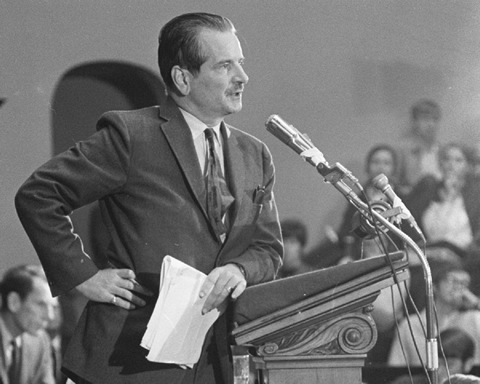Born in Meaford, Ontario, in 1916, Claude Bissell was the youngest of nine children in a family of modest means. At 16, he arrived at U of T’s University College, a shy scholarship student eager to study English and history. In Halfway Up Parnassus, his personal account of the University of Toronto between 1932 and 1971, he describes how news of his U of T scholarship came by a telephone call from a newspaper reporter. In retrospect, he says it was “one of the great, dazzling moments of my life.”
In 1936, Bissell entered U of T’s graduate school, earning his master’s in English. He completed his PhD at Cornell University in Ithaca, New York, returning to U of T in 1941 to become an English lecturer at University College.
His passion was Victorian literature and the work of Irish dramatist George Bernard Shaw. From the early 1950s, he also wrote and spoke widely about the novelists, poets, scholars and public figures whose work helped define Canada’s identity. He believed − well ahead of his time − that literature had the power to shape national ideals and attitudes.
As Bissell headed toward a sterling academic career, the Second World War broke out. He enlisted in 1942, serving with the Argyll and Sutherland Highlanders of Canada. He returned to U of T’s University College in 1947 as an English professor; he was accompanied by his wife, Christina Gray of Scotland. They quickly became a presence on campus – he the reserved scholar, she the high-spirited extrovert. Their first home was the Dean’s House at University College (now Bissell House).
In the early 1950s, Bissell began a rapid ascent in university administration. From 1956 to ’58 he served as president of Ottawa’s Carleton University, where he founded the Institute of Canadian Studies. Then in 1958 he was appointed U of T’s eighth president. He held the position for 13 years, save a one-year leave to be the first William Lyon Mackenzie King Visiting Professor of Canadian Studies at Harvard.
Explaining his decision to leave Carleton, Bissell writes in Halfway Up Parnassus, “The University of Toronto was still, in my mind, the great good place. It had given me some idea of what a civilized, humane society could be. It was certainly the strongest Canadian university by the only criterion that mattered – the international distinction of the academic staff. With a number of changes it could easily become a great university.”
Bissell’s presidency was a period of rapid change at U of T: the Mississauga and Scarborough campuses opened, new colleges and faculties were founded, the graduate school expanded, and enrolment more than doubled. U of T’s international stature grew.
Bissell passed away on June 21, 2000.
Recent Posts
U of T’s Feminist Sports Club Is Here to Bend the Rules
The group invites non-athletes to try their hand at games like dodgeball and basketball in a fun – and distinctly supportive – atmosphere
From Mental Health Studies to Michelin Guide
U of T Scarborough alum Ambica Jain’s unexpected path to restaurant success
A Blueprint for Global Prosperity
Researchers across U of T are banding together to help the United Nations meet its 17 sustainable development goals





